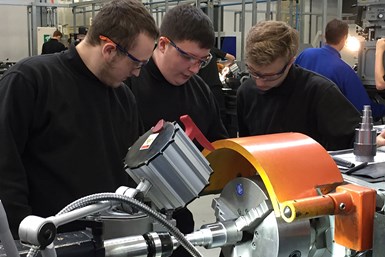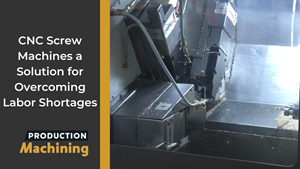Training Is More Than a Skills Upgrade
Training is more than a skills upgrade. Training is a process that creates a virtuous cycle for your performers, culture and shop. Why do we train? Why do we need to train?
Why do we train? Because we continue to need talented professionals to produce the components critical to today’s human safety and quality of life technologies: automotive, aerospace, medical and electronics.
Why do we need to train? There were 806,000 manufacturing job openings in September 2022. At the same time, 10,000 baby boomers reach retirement age every day. By 2030, all baby boomers will have reached or passed the age of 65. In shops where standard work instructions are not available for each and every task, the “institutional knowledge” actually belongs to those professionals who have it, not to the institution. The tribal knowledge is in possession of the members of the tribe, not the tribe itself. As the makeup of our tribe of performers changes as personnel changes, so too can we lose or gain tribal and institutional knowledge.
Training and the New Performer
A new performer brings talent and abilities, but unless experienced, they need to learn many specifics about the work for which they will be responsible. As human beings, they will also bring a feeling of vulnerability, if not fear, about consequences should they do something wrong. But, if they are new, how will they know when something is wrong? Right and wrong can be obvious, but again, may not be to someone with little context or experience for their new job.
By providing training, an employer is trying to improve the direct skills, activities and thinking of the new performer. A trained employee is less likely to make an error, do the wrong thing or produce nonconforming products. This should be sufficient to justify our investment in training.
And yet, in my mind, this is the least or lowest payoff for training. Changing our frame of reference to the new performer, we can see that the value of the training to them is far, far greater than the value the employer thinks they are getting.
Benefits of Providing Training
The obvious and most direct benefit of providing training is the provision of needed skills — skills needed at the organization and by the performer. Providing sought-after skills is an investment both in the new performer, as well as in the enterprise. Win-Win.
Clearly, there is a benefit recognized by the performer as they master these skills and become an increasingly important part of the new work “tribe.” All humans want to be valued, connect and belong. Investing in training for individuals is actually an investment in the strength of the tribe.
Improves morale. By raising competency and removing guesswork, our performers have less to fear as a consequence of making a bad decision. Knowing the What, How and Why of each task helps performers gain confidence, reducing fear and thus making it possible for them to have a positive attitude about their performance. This positive attitude fosters a sense of confidence, and a confident performer is more productive — less hesitation before doing a needed task — and more comfortable
on the job.
Improves joy of work and job satisfaction. Contrary to the management attitudes of the last century, our skilled and talented performers are not economic automata trading time and effort for cash. Today’s workforce seeks meaning and value out of everything they do. A confident performer can see and enjoy the satisfaction of both tangible, positive results for their efforts at the end of the day and of knowing the work they did was essential and made a difference.
Improved morale, satisfaction and joy of work leads collectively to a positive, engaging and sustainable work culture. Which leads to unexpected employer benefits.
Improves recruiting. Finding and hiring workforce is a difficult challenge these days, but shops with a reputation for providing sought-after skills training are finding it easier to keep their talent pipeline flowing. It is one thing for a potential employee to wonder if a shop is a good place to work. It is another for them to learn that there is a plan in place to build up their skills and there is a clear career path as they master the provided training. There is no doubt that great housekeeping and wages are keys to people deciding where to work. But the real decision-maker — as I have heard from recent additions to our workforce and from their families — is the acknowledgment of the value of the training investment to give them a sought-after skill and an assured career path.
Improves retention. Many employers will argue that if they train performers, the performers will leave. I will argue simply that no one leaves “just because they are trained.” They will leave because of other quality of work life reasons, not because they are now trained. If people are fleeing for the exits in a shop, it isn’t because of the training they received. Trained people are more satisfied, less fearful and more confident on the job. They aren’t looking to leave when they are comfortable and satisfied where they are. The real issue, I would argue, is “What if you fail to train them and they stay?”
A final reason for training — and training to standard work methods that are used in your shop. There are many ways to accomplish any particular precision machining goal. And, collectively, these many methods can all result in different levels of conformance with variation in the results achieved. By training and using standard work procedures, a shop and its performers can reduce variation, variability, unexpected results and reduce waste. This is how we improve quality. While it is not unexpected that improving training will improve quality, it is seldom thought of as we deal with the tyranny of the urgent in our daily operations.
Training is more than just a management chore or a necessary evil. Training our performers is actually the first step of a virtuous cycle where competence, confidence, morale, performance, quality and a company’s reputation all grow and improve.
Why should we train? Because the returns are truly immeasurable across our individual performers, our tribe, our community and our economy. As well as a powerful force for improved results for our company.
Read More Articles from PMPA:
- Roles of Women in Manufacturing Series: Manufacturing Skills Training — Virginia Martinez and Laiken Carrillo
- Welcome to John Habe IV, PMPA’s New Board President
About the Author
Miles Free III
Miles Free III is the PMPA Director of Industry Affairs with over 40 years of experience in the areas of manufacturing, quality, and steelmaking. He helps answer “How?, “With what?” and “Really?” Miles’ blog is at pmpaspeakingofprecision.com; email – mfree@pmpa.org; website – pmpa.org
Related Content
Emerging Leader's Dedication to Education
Instilling confidence throughout a shop floor can do wonders for company morale while increasing productivity.
Read MoreStrengthening Manufacturing Workplaces Through Active Listening
A good strategy to weather the storms of manufacturing market upheavals and unpredictable factors is to commit to continuous, active employee listening.
Read MoreVideo Tech Brief: CNC Screw Machines a Solution for Overcoming Labor Shortages
CNC screw machines can exceed job shop productivity and enable manufacturers to overcome perpetual employment gaps.
Read MoreRecognizing Signs of a Degrading Workplace Culture
Is your machine shop missing key “culture elements?” Here are ways to identify if your organization is heading in the right or wrong direction in terms of establishing a healthy company culture.
Read MoreRead Next
A Tooling Workshop Worth a Visit
Marubeni Citizen-Cincom’s tooling and accessory workshop offers a chance to learn more about ancillary devices that can boost machining efficiency and capability.
Read More5 Aspects of PMTS I Appreciate
The three-day edition of the 2025 Precision Machining Technology Show kicks off at the start of April. I’ll be there, and here are some reasons why.
Read MoreEmerging Leaders Nominations Now Open
Here’s your chance to highlight a young person in your manufacturing business who is on the path to be a future leader moving your company forward.
Read More























